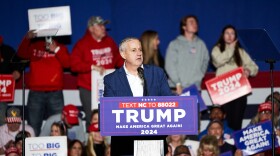The number of Latino voters is growing, both in North Carolina and nationally. But they're far from a monolithic voting bloc, and some are bucking expectations and voting Republican.
It's Hispanic Heritage Month, and Grace Vitaglione looked at the voting trends for this fast-growing community for Carolina Public Press. She joins me now.
Marshall Terry: First of all, Grace, what did you find about the number of Latino voters in North Carolina and how that share has changed?
Grace Vitaglione: Yeah, so in 2022, just under 4% of registered voters in North Carolina, self-identified as Latino, so a smaller share of the electorate. But that share is growing and going to keep growing. The Latino community has been the fastest-growing population in the state since the 1990s.
Terry: Now, are they turning out to vote?
Vitaglione: It depends on what year. There was a little bit of a surge nationally in 2016 among Latino voters, turnout among Latino voters dropped in 2022. And the turnout is actually also impacted by the fact that the Latino voting bloc is younger than other demographics. And millennial and Generation Z voters as a whole in North Carolina also have low turnout rates of their own. So, the youth vote and the Latino vote kind of intersect in those ways.
And there's just some challenges to mobilizing Latino voters. There's definitely a lack of Latino candidates in North Carolina, a lack of Latino elected officials, and there's also the issue of misinformation that might spread on social media like WhatsApp, which is super popular with Latino users. That misinformation plays into what people know about voting. We have this new voter ID requirement this year, that could be confusing for a lot of people, not just some Latino voters. And then this is also impacted by the fact that Black and brown voters are also less likely to already have those acceptable voting IDs, so some obstacles there.
Another factor that stood out to me is actually where people and their families have come from. A source of mine said, you know, Election Day is celebrated in her former country of Costa Rica. She brought that mindset here with her to the United States. But maybe some people came from countries where there was not a lot of faith in the democratic process, so they might carry that sentiment with them here, and they might pass on that sentiment to their children, right? If a child sees that their parent doesn't really value voting, they might be less likely to value voting themselves.
Terry: So those are some of the challenges getting Latinos to the polls. What motivates them? One sentence that stood out to me in your piece was this one: “Understanding Latino voters’ political stance isn't as simple as labeling them left or right.” I think there's a perception that Latinos are single-issue voters focused on immigration. But you found out that it's more complex than that, right?
Vitaglione: First of all, that's an issue with labeling any group of people as one-dimensional. Latino immigrants in the U.S. come from all sorts of political backgrounds and experiences. Like any voter on any individual level, you're just going to have things that are more important to you specifically.
So yes, not all Latino voters only care about immigration. But, of course, we have to remember that for many Latino voters, it is still highly, highly important. One of my sources said even if Latino voters have a bunch of other values that they really care about, for many of them the immigration platform is going to take priority, and that can also have to do with how connected you are to the immigrant experience. If you're an immigrant yourself, that's more likely to be a priority for you. But if perhaps your grandmother immigrated from El Salvador, but you and your parents grew up in America, you just might not see immigration as a personal priority for you and other voting values might take precedence.
For example, a lot of Latinos are religious, so they might identify with more religious candidates, which often tend to be Republican candidates. I also learned that school choice is becoming more of an issue for some Latino voters and the economy, as well. The takeaway here is yes, a lot of Latino voters care about immigration, but it's not as simple as that.
Terry: Another issue, of course, is abortion, which Democrats are really using to drive voters to the polls. But Latino voters seem more conservative on that issue than the party, or voters, overall. Is that something that is an opportunity for Republicans?
Vitaglione: I would say it is an opportunity. The debate is how large of an opportunity it is. I've had Republican Party-affiliated sources say this is a huge, huge opportunity. I've had other sources say a lot of Latinos are pro-choice. It’s true that nationally, Latino voters are a little bit more conservative on that issue but, still, a large share of Latino voters are in favor of pro-choice.
It's definitely not a no. Even if they aren't the majority, there are a ton of Latino voters who are in favor of limiting access to abortion. And like we talked about, (they) prioritize that over immigration maybe. But I also heard from multiple people that the Republican Party's rhetoric around immigrants really turns off a lot of Latino voters who might otherwise be interested, maybe because of abortion.
I had one source say the Republican Party needs to focus more on these connection points that they have with Latino voters. One possibility for that is legal immigration, talking about being in favor of creating these avenues for legal immigration while still securing the border.
Terry: And one activist told you that Latino voters aren't quite a large enough bloc to make up the margin of victory for many candidates, but that they will be soon. So, what are people on both sides of the aisle doing to mobilize Latino voters in 2024?
Vitaglione: It's safe to say that both parties have recognized that Latino voters in North Carolina are a significant influence. It would be reasonable to expect to see more outrage from candidates on both sides. That outreach really isn't where it should be, according to a lot of activists.
There's also the argument that neither party has done enough to interest the Latino voters right now. I also had activists stress to me that consistent engagement is super important. You have to start now, not just around an important election cycle. And I would also say that part of this work is to get Latino youth involved as well, like we talked about, and to also reach the rural Latino communities because those are often not talked about as much but they're definitely there — and they're growing.
In general, the main actions around civic engagement would be registering voters, holding candidate forums (and) putting out accurate information online. That's a space in which a lot of the sources I talked to are already working. I would say that they're pretty hopeful.








